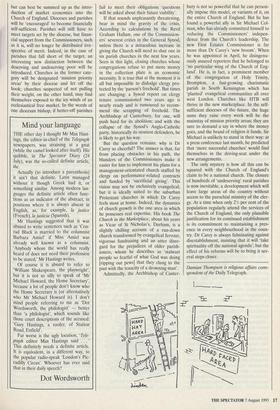Mind your language
THE other day I thought Mr Max Hast- ings, the editor-in-chief of the Telegraph newspapers, was straining at a gnat (while the camel looked after itself). His quibble, in The Spectator Diary (24 July), was the so-called definite article, the.
Actually (to introduce a parenthesis) it ain't that definite. Latin managed without it though Greek had it, or something similar. Among modern lan- guages the definite article often func- tions as an indicator of the abstract, in positions where it is always absent in English, as, for example, la justice (French), la justicia (Spanish).
Mr Hastings suggested that it was absurd to write sentences such as 'Con- rad Black is married to the columnist Barbara Amiel' if Miss Amiel was already well known as a columnist. `Anybody whom the world has really heard of does not need their profession to be stated,' Mr Hastings writes.
Of course it is absurd to refer to `William Shakespeare, the playwright', but it is not so silly to speak of `Mr Michael Howard, the Home Secretary', because a lot of people don't know who the Home Secretary is (or alternatively who Mr Michael Howard is). I don't mind people referring to me as 'Dot Wordsworth, the philologist' — better than 'a philologist', which sounds like those court descriptions of the accused: `Gary Hastings, a roofer, of Station Road, Enfield'.
Far worse is the ugly locution, 'Tele- graph editor Max Hastings said . . . ' This definitely needs a definite article. It is equivalent, in a different way, to the popular radio-speak `London's Pic- cadilly Circus'. Whoever has ever said that in their daily speech?
Dot Wordsworth


















































 Previous page
Previous page